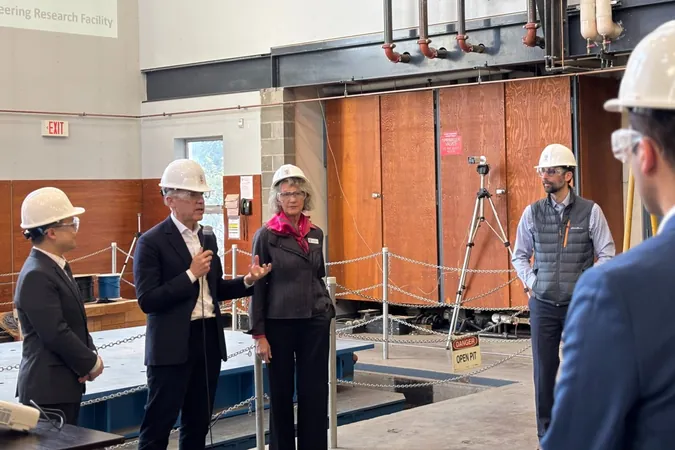
OpenAI Reverses Course on Restructuring: Nonprofit Arm Retains Control of ChatGPT
2025-05-05
Author: Olivia
OpenAI's Bold Move Backtracks After Backlash
In a dramatic shift, OpenAI revealed on Monday that it will maintain its nonprofit's control over ChatGPT and other AI products, abandoning its previous plan to shift authority to a newly-created public-benefit corporation. This decision comes after intense scrutiny and pushback from influential critics, including Elon Musk.
Crucial Funding Hangs in the Balance
To implement this proposed restructuring, OpenAI must secure approval from the attorney general's offices in California and Delaware by early next year. This approval is vital as it could open the doors to up to $30 billion in investment from SoftBank and other entities, which is essential for OpenAI to stay ahead in the fiercely competitive world of generative AI.
A History of Controversy
Founded in 2015 with a noble mission to benefit humanity, OpenAI quickly found itself at odds with its original nonprofit ideals due to the astronomical costs associated with advancing AI technology. The recent attempts to alter its structure raised alarm, leading to pushback from Musk, one of the lab's co-founders. In a legal tussle, Musk accused OpenAI of straying from its foundational purpose, which culminated in a lawsuit in 2024.
Civic Leaders and Public Pressure Make an Impact
Following significant public outcry and advocacy from multiple groups against the original restructuring plans, OpenAI's board chair, Bret Taylor, announced the decision to revert to nonprofit control after engaging in productive dialogue with relevant attorney general offices. This consensus has been hailed as a triumph for public interest.
Microsoft's Power Play
As OpenAI’s largest investor, Microsoft holds the power to veto any restructuring plans. The tech giant is simultaneously nurturing its own AI division, which might present a competitive threat while minimizing investment risks in OpenAI's startup.
Looking Ahead: The PBC Framework
OpenAI's new structure will see the nonprofit controlling a public-benefit corporation (PBC), similar to its rivals, Anthropic and xAI. This model is designed to balance shareholder profits with societal benefits. In a hopeful note, the company reassured stakeholders that its mission remains unchanged even as it adapts its corporate structure.
Ongoing Scrutiny from Regulators
Delaware’s attorney general expressed cautious optimism about OpenAI's commitment to maintaining its nonprofit priorities. Meanwhile, California's attorney general’s office is also conducting a thorough review of the proposed plan to ensure compliance with charitable objectives.
Dissenting Voices Remain
Despite the positive development, critics like Robert Weissman of Public Citizen argue that OpenAI's current plans still fall short. They assert that without concrete safeguards, the for-profit entity may stray far from the nonprofit’s mission of serving humanity.
A Unique Position in the Corporate World
As it stands, OpenAI's new nonprofit arm is set to hold shares in the PBC, valued at an astonishing $300 billion. This could lead the nonprofit to become one of the richest foundations in history while complicating the critical issue of independence from business motives. Activists are pressuring regulators to ensure clear separations to prevent a conflict of interest.
A New Era for OpenAI
OpenAI's spokesperson affirmed that the nonprofit will have significant influence over the PBC, including the power to appoint board members. As CEO Sam Altman emphasized, "OpenAI is not a normal company and never will be," signaling the company's commitment to balancing corporate growth with its foundational ideals.









 Brasil (PT)
Brasil (PT)
 Canada (EN)
Canada (EN)
 Chile (ES)
Chile (ES)
 Česko (CS)
Česko (CS)
 대한민국 (KO)
대한민국 (KO)
 España (ES)
España (ES)
 France (FR)
France (FR)
 Hong Kong (EN)
Hong Kong (EN)
 Italia (IT)
Italia (IT)
 日本 (JA)
日本 (JA)
 Magyarország (HU)
Magyarország (HU)
 Norge (NO)
Norge (NO)
 Polska (PL)
Polska (PL)
 Schweiz (DE)
Schweiz (DE)
 Singapore (EN)
Singapore (EN)
 Sverige (SV)
Sverige (SV)
 Suomi (FI)
Suomi (FI)
 Türkiye (TR)
Türkiye (TR)
 الإمارات العربية المتحدة (AR)
الإمارات العربية المتحدة (AR)